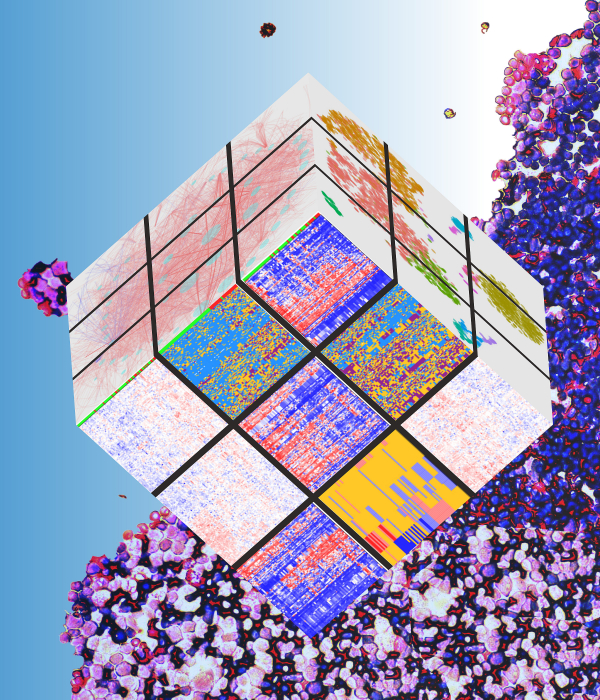Clinical bioinformatics and translational genomics
Our group "Clinical Bioinformatics -Translational Genomics" which is also part of the DKFZ division of Pediatric Neurooncology works on the identification and classification of genetic and epigenetic changes in childhood tumors using computational methods. This work enables us to generate personalized molecular tumor profiles that allow physicians to design a tailored therapy approach for each individual patient. In addition, we focus on bioinformatics method development for optimized diagnosis and prognosis of pediatric cancer based on molecular data from high-throughput sequencing, as well as the analysis of possible mechanisms of tumorigenesis.
With our analyses, we significantly support the INFORM program, an international project to create personalized molecular tumor profiles for children with recurrent or refractory tumors. By analyzing the tumor data, we identify molecular changes that may represent potential targets for a given drug and therefore may help treating physicians to find tailored therapies for the young patient.
As part of a European initiative (ITCC-P4), which aims at developing a preclinical platform for solid pediatric cancer types, our group is involved in the bioinformatic analysis and research. To better predict therapeutic efficacy in vivo, patient-derived xenograft models (PDXs), organoids, and mouse models for preclinical testing are being developed and utilized. Using molecular data based on high-throughput sequencing, we create molecular profiles and comparisons of the (epi-)genetic changes in patient material and the different models. Additionally, we are interested in uncovering the molecular mechanisms and biomarkers that enable response to therapy. Furthermore, we are interested in the question of how tumor cells can adapt to therapy and thereby become resistant.
Our group is also particularly interested in understanding genetic alterations associated with cancer predisposition and we have several large scale efforts both internally and in collaboration with other institutions directed towards this. These studies aim to identify novel pediatric predisposition genes, understand the effect adult type predisposition genes have in pediatric cancers and to discover ways to improve treatment approaches for patients with known DNA damage repair disorders (ADDRess) and suspected cancer predisposition syndromes (German Childhood Cancer Registry Study).
We also have projects directed towards understanding of the contribution of the tumor immune microenvironment using de-convolution methods in RNA sequencing and DNA methylation data, genomic analyses of liquid biopsy samples, analyzing and designing two-dimensional CRISPR screening experiments to uncover new synthetic lethal gene interactions in pediatric cancer cell lines.
Thatikonda, V., Islam, S. M. A., Autry, R. J., Jones, B. C., Gröbner, S. N., Warsow, G., Hutter, B., Huebschmann, D., Fröhling, S., Kool, M., Blattner-Johnson, M., Jones, D. T. W., Alexandrov, L. B., Pfister, S. M., & Jäger, N. (2023). Comprehensive analysis of mutational signatures reveals distinct patterns and molecular processes across 27 pediatric cancers. Nature Cancer.
Kratz, C. P., Smirnov, D., Autry, R., Jäger, N., Waszak, S. M., Großhennig, A., Berutti, R., Wendorff, M., Hainaut, P., Pfister, S. M., Prokisch, H., Ripperger, T., & Malkin, D. (2022). Heterozygous BRCA1 and BRCA2 and Mismatch Repair Gene Pathogenic Variants in Children and Adolescents With Cancer. JNCI: Journal of the National Cancer Institute, 114(11), 1523-1532.
ElHarouni, D., Berker, Y., Peterziel, H., Gopisetty, A., Turunen, L., Kreth, S., Stainczyk, S. A., Oehme, I., Pietiäinen, V., Jäger, N., Witt, O., Schlesner, M., & Oppermann, S. (2022). iTReX: Interactive exploration of mono- and combination therapy dose response profiling data. Pharmacological Research, 175, 105996.
Peterziel, H., Jamaladdin, N., ElHarouni, D., Gerloff, X. F., Herter, S., Fiesel, P., Berker, Y., Blattner-Johnson, M., Schramm, K., Jones, B. C., Reuss, D., Turunen, L., Friedenauer, A., Holland-Letz, T., Sill, M., Weiser, L., Previti, C., Balasubramanian, G., Gerber, N. U., Gojo, J., Hutter, C., Øra, I., Lohi, O., Kattamis, A., de Wilde, B., Westermann, F., Tippelt, S., Graf, N., Nathrath, M., Sparber-Sauer, M., Sehested, A., Kramm, C. M., Dirksen, U., Kallioniemi, O., Pfister, S. M., van Tilburg, C. M., Jones, D. T. W., Saarela, J., Pietiäinen, V., Jäger, N., Schlesner, M., Kopp-Schneider, A., Oppermann, S., Milde, T., Witt, O., & Oehme, I. (2022). Drug sensitivity profiling of 3D tumor tissue cultures in the pediatric precision oncology program INFORM. npj Precision Oncology, 6(1), 94.
Nabbi, A., Beck, P., Delaidelli, A., Oldridge, D. A., Sudhaman, S., Zhu, K., Cindy Yang, S. Y., Mulder, D. T., Bruce, J. P., Paulson, J. N., Raman, P., Zhu, Y., Resnick, A. C., Sorensen, P. H., Sill, M., Brabetz, S., Lambo, S., Malkin, D., Johann, P. D., Kool, M., Jones, D. T. W., Pfister, S. M., Jäger, N., & Pugh, T. J. (2022). Transcriptional immunogenomic analysis reveals distinct immunological clusters in pediatric nervous system tumours. bioRxiv, 2022.2009.2020.508719
Beck, P., Selle, B., Madenach, L., Jones, D. T. W., Vokuhl, C., Gopisetty, A., Nabbi, A., Brecht, I. B., Ebinger, M., Wegert, J., Graf, N., Gessler, M., Pfister, S. M., & Jäger, N. (2022). The genomic landscape of pediatric renal cell carcinomas. iScience, 25(4), 104167.
Ulrich, E., Pfister, S. M., & Jäger, N. (2022). Revana: a comprehensive tool for regulatory variant analysis and visualization of cancer genomes. Bioinformatics, 39(1).
- Dr. Robert Autry (Group Leader)
- Dr. Prakash Balasubramanian, PhD (Senior Scientist)
- Rolf Kabbe (IT-Coordinator & Cluster Admin)
- Dr. Christopher Previti (Bioinformatician)
- Dr. Apurva Gopisetty (Postdoc)
- Luisa Becker (PhD student)
- Olga Ermakova (PhD student)
- Devishi Kesar (PhD student)
- Lukas Madenach (PhD student)
- Martha O'Brien (PhD student)
- Elias Ulrich (MD student)

Postal address:
KiTZ - Hopp Children's Cancer Center Heidelberg
Im Neuenheimer Feld 580
D- 69120 Heidelberg
Germany


